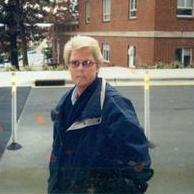As a Mother of a child with mental illness I’ve had to deal with a lot of struggles with J. for a very long time. At the time of his very early diagnosis I was married but in a situation that I found myself dealing with this alone. Family didn’t understand and I had very little knowledge as to how to handle and work through those many daily struggles. After the first hospitalization, that almost did me in, I knew the answer to some of my questions as to what J. was going to be dealing with the rest of his life so my first step was to learn all I could about his illness. Books, questions to the doctors, and even a little internet research helped me to gain a better understanding of what I was dealing with and the struggles J. was going through. Of course over the following years we had other hospitalizations but each time we learned more and gained a lot of valuable information. For me this was a team effort that I knew J. and I were going to have to work through TOGETHER! Many days I felt I was losing the battle to help him and then other days I felt we were getting the tough work done. I knew there were many great groups out there to offer support but it was a struggle for me to reach out to them and most of the time I was just too exhausted to do it!
As J. got older and bigger in size he started to become more difficult to handle. I knew as a family, me and his sister especially, were struggling with the all time consuming energy to get through a day and even an hour with J. My problems with his father were getting worse and it was just getting too much to handle all alone. For so long though, and still today I see it, people just do not understand what you go through unless you have to walk in those steps but still it was hard to reach out to family. At this point I started looking for some kind of inpatient placement for J. We went into one program for about a year but J. was moved from house to house and he did not respond well at all. J. came home and soon afterwards went into the hospital to stabilize meds and his mood swings. I reached out to one more program at the age of 16 and he went to live in a wilderness style program for boys. I couldn’t believe I was putting my child into a program that was so strict and lacked so many of the things we take for granted everyday. He struggled in the beginning, as to be expected, but gradually started responding to all the various things put into place for this to be a success for each young man there. J. came out of there at 18 years old a much better person. He had learned to talk through his anger and learned to control his outburst. Was he perfect, no, but he learned very valuable skills there. He was a different person. The one thing he didn’t learn though was how to start managing his life on his own… to be more independent and to make better choices as an adult. After about 6 months, I felt J. needed to go somewhere that could teach him some life skills: paying bills, managing money, cooking for himself, independent but monitored, etc. I had tried this at home but as every parent can say our kids always think they know a little more than us at that age and he was not interested in his mother trying to tell him what to do. So we went to a new placement for independent living. This became a disaster and my nightmare in real time! He stopped taking meds as needed, spent all his money, was easily manipulated by peers and learned hard lessons about trust. There was no tiered program to learn this stuff, just thrown out to the wolves so to speak. I, as his Mother got no support from the program and was basically told to mind my own business. J. become his own worst enemy and was told he had to leave the program. I felt they gave up on him after not helping him as this “new” program has promoted itself to do. I was given 10 hours notice to move him out and all of his belongings. What an experience! This caused J. to withdraw and didn’t believe anything or that anyone cared enough to help. Again, back to the hospital to stabilize medicine because he had been off of them for so long and he was depressed and was having problems but also back to the beginning of reminding him of all he had accomplished at the wilderness program. Thankfully, J. had retained enough that he bounced back fairly quickly. J. spent the next year at home with family but just had no motivation to do anything with his life because we as a family had made it too easy for him. I started trying to find something or somewhere that could teach him what he was so resistant to do at home.
Now I come to Caramore! I stumbled over the website one day and started doing some research about the program. I made a few phone calls. Then I approached J. about Caramore. He was so resistant but after a few talks decided to look into “that place”…as he called it. We started the application process and worked with Jacob Long. I took J. for a tour and he listened to everything Jacob told him. J. told me afterwards that Jacob was so cool and seemed to get him and what he was saying and feeling. I breathed a sigh of relief! After some time we got notice that J. had a spot to move into and we started preparing for this. J. was scared and nervous because he didn’t want to be lied to and believe in”these people”. I was nervous because I had to trust strangers to do right by my child, though he was an adult. I took J. and dropped him off. While J. did struggle a lot to begin with, he also loved it. He enjoyed the people he lived with and started working a real job and grew to love that too! After a couple of months I saw progress with him.
I am under no illusions that all is perfect in J.’s world and he has his moments of struggles but the staff at Caramore has been able to help him through all of this. J. will always have struggles but the staff helps him work through that. He has made friends that maybe have the same struggles and can relate to him. I have made many phone calls to Barry to help me out with concerns I had and he has always been patient, kind, considerate and very understanding. I have never felt excluded from J. and his needs and how to help him. Many people behind the scenes have worked with my son to help him be more successful and help him out with the guidance he needs when he struggles. J. is very stubborn but Caramore never gives up and always give him what he needs, though sometimes he may not see it at the time. I have felt Caramore has always had J.’s best interests at heart. He has grown in so many ways and I give him credit for his hard work and determination but I also give credit to Caramore. Caramore has helped our family finish what others have started with him. The wilderness experience taught J. better ways to deal with his anger, his family has taught him how to love and know we are there for him good and bad but Caramore has taught J. to be a productive young man in today’s society. Caramore opened up doors for him that he never thought would open. They showed him how to use his strengths but to also how to work on his weaknesses. J. has worked hard and sometimes wants to give up but Caramore NEVER gives up on him. Caramore continues to show J. how great he can be!!!!
As a Mother, I would always recommend Caramore to anyone I saw going through similar struggles with a family member. I also thank God for leading me to a program that has helped my son so much and has never given up on him even during his hardest struggle. Mental illness affects not just the person but the whole family and Caramore helps keep the family involved as much as possible. Caramore is a team of people…some we see and some we never hear about but I am so very thankful for each of them.
With gracious thanks always,
Christina






































